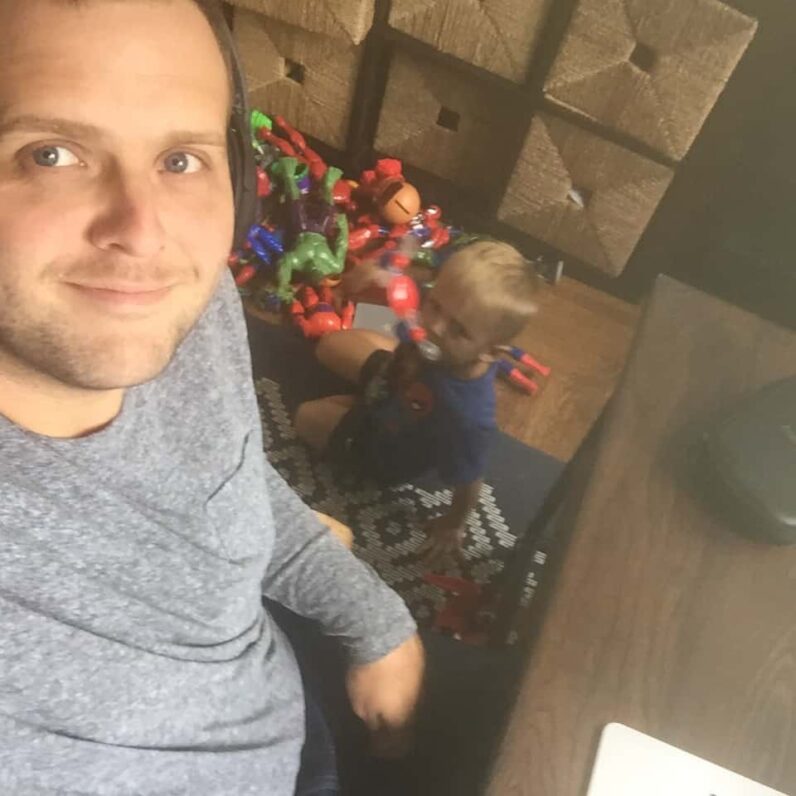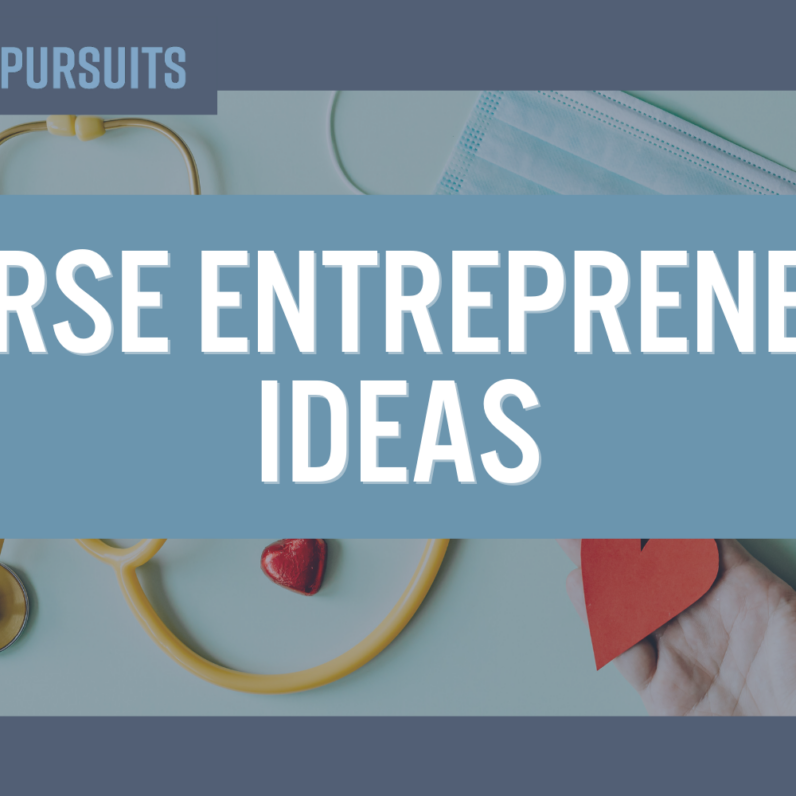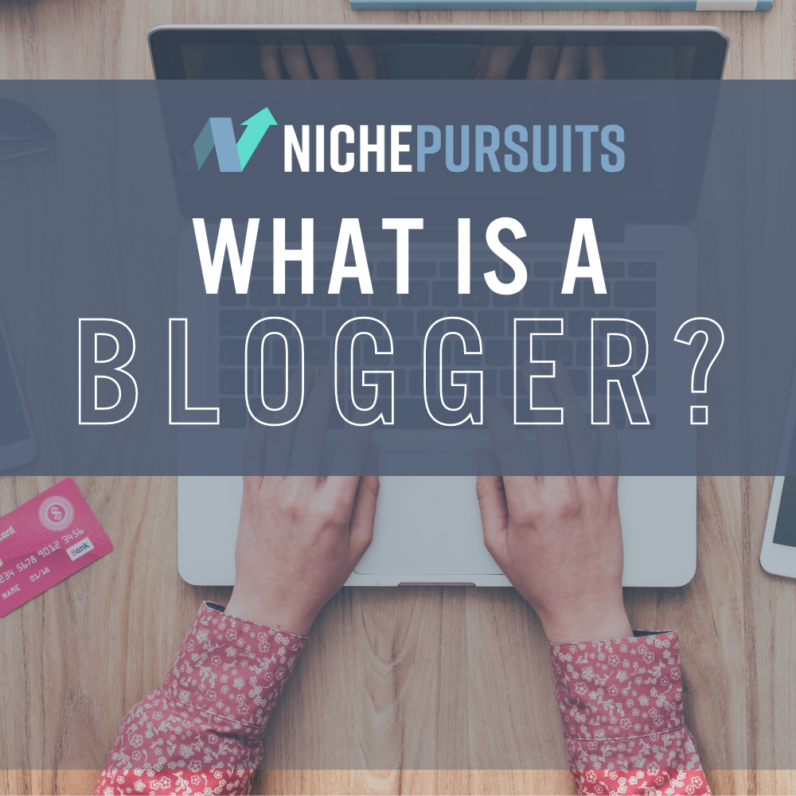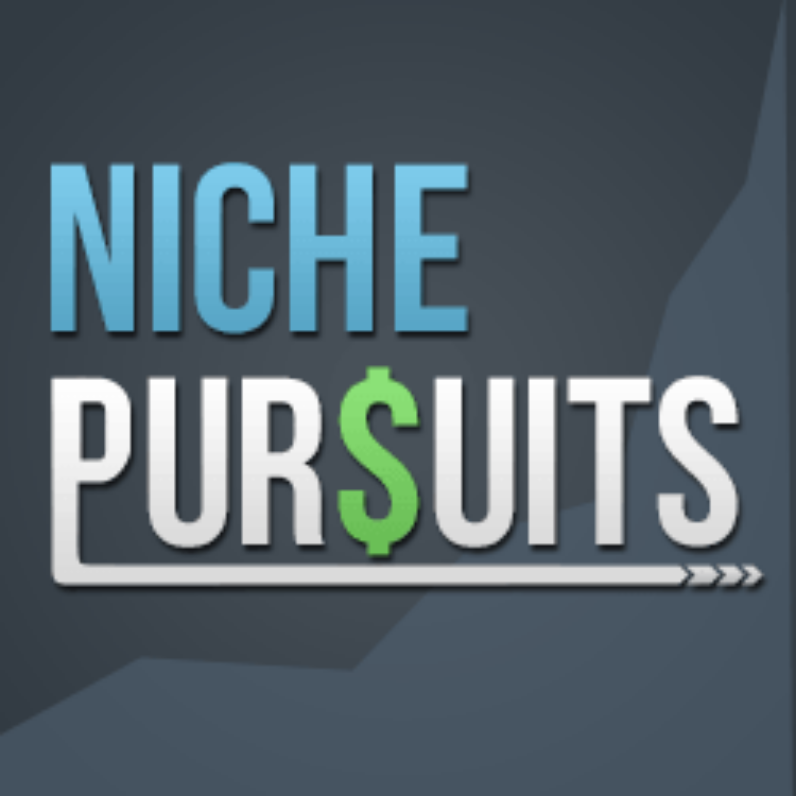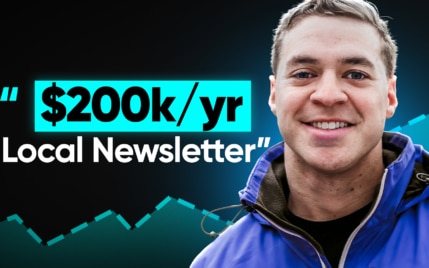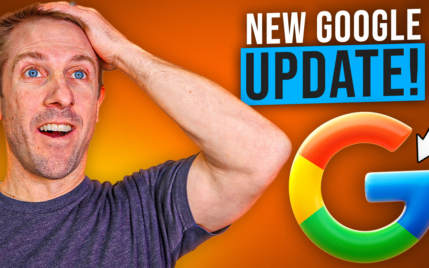How This Newsletter and SEO Writing Specialist Grows Multiple 6-Figure Businesses
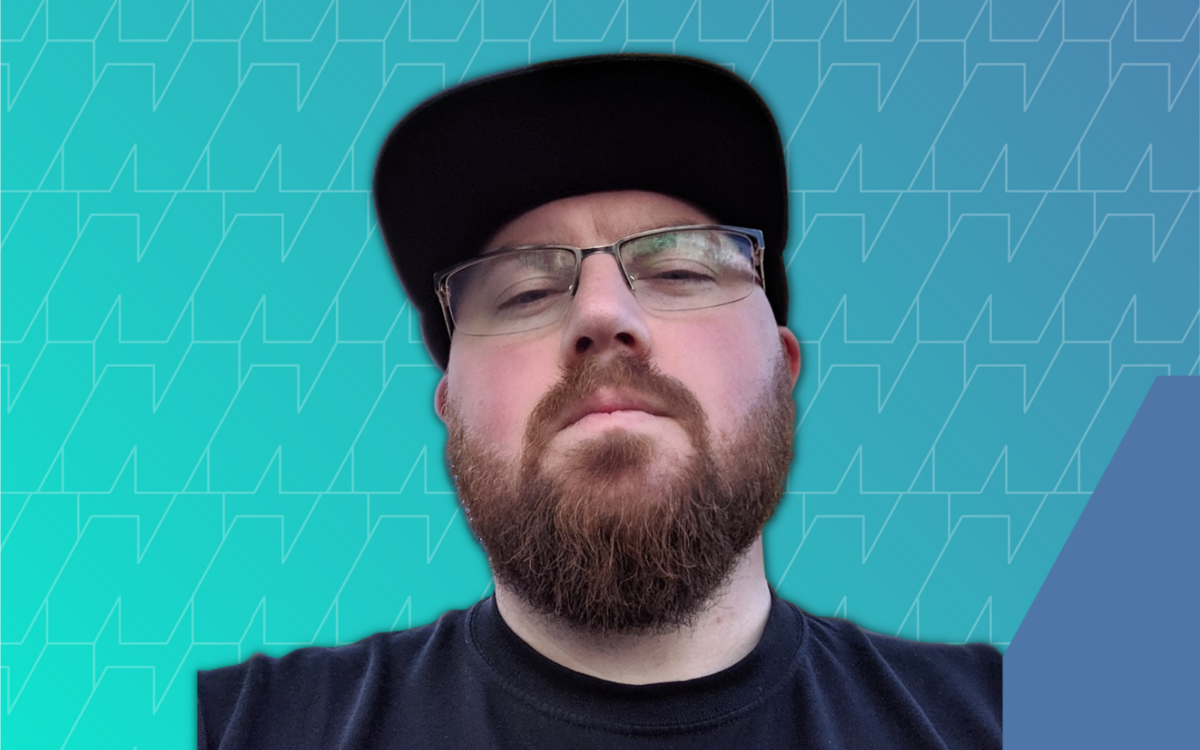
When you buy something through one of the links on our site, we may earn an affiliate commission.
Sean Markey is back on the Niche Pursuits podcast after a few years, to discuss all things newsletters, aged domains, community, partnerships, and more!
Sean's been working in SEO since 2011, initially focusing on affiliate sites before transitioning to agency work. And despite facing challenges due to Google updates impacting his traffic, he found success in the CBD and cannabis niches.
Aside from the actual writing aspects, his expertise lies in using aged domains to scale affiliate sites effectively.
But around 2020 Sean shifted his focus to writing an SEO newsletter called Rank Theory, offering strategy consultations as his primary income source.
And he shares a lot of helpful tips on what he's done to grow it into an actual business.
For one he shares how starting a successful newsletter requires the basics like unique content that resonates with readers and improves over time. And for this, consistency and the value of uniqueness in newsletter content creation are particular keys.
Thus he advises against relying on AI-generated content for newsletters and breaking traditional best practices to stand out.
Sean also shares how he acquired the newsletter TheWeeklySEO.com and integrated it into his own, learning from the experience and discussing it as a growth strategy - similar to acquiring an aged domain.
Sean also discusses the evolution of aged domains, emphasizing quality domains with brand value, sharing how redirect chains may be a thing of the past in today's SEO landscape.
He's also involved in building a community and other partnerships, including discussing some of the keys for making partnerships successful.
With this Sean talks about partnering on a lucrative domain project with high authority and traffic potential, aiming to white-label a product as opposed to taking the traditional affiliate route.
He plans to stay focused on current projects and avoid distractions, leveraging opportunities that target like-minded site builders, entrepreneurs, and SEO enthusiasts and it's definitely interesting to hear his strategies to accomplish this!
Watch The Interview
Topics Sean Markey Covers
- Growing a newsletter
- Monetizing a newsletter
- Pros and cons of best practices
- The state of aged domains
- Keys to success with newsletters
- Acquiring an existing newsletter
- Tips for successful partnerships
- AI newsletters
- Doubling down on strengths
- Community growth strategies
- White-labeling products
- And more...
Links & Resources
- Home - [rank theory]
- Advise SEO Community - Advise.so
- Sean Markey's Strategies for Buying, Flipping, and Building Sites With Expired Domains In 2024
- Use coupon code “podcast” to get $15 off Link Whisper to build smarter internal links fast
- Get SEO Consulting from the Niche Pursuits Podcast Host, Jared Bauman.
transcription
Jared: All right. Welcome back to the niche pursuits podcast. My name is Jared Bauman. And today we are joined by Sean Markey with a rank theory. com. Sean, welcome on board.
Sean: Hey, thanks for having me.
Jared: This is a, we have a repeat guest in the house. We were talking about beforehand. You were last on the podcast before I hosted.
So probably, well, I guess that puts us at three plus years ago, but I'm welcome back. Your first episode is really you. Really great. We'll get that included in the show notes, but, um, maybe catch us up to speed. We've got a lot of new listeners since then. And, and for certainly for people who did listen to that first show and want to just hear what's going on, maybe bring us up to speed on who you are and what you're involved with.
Sean: Yep. So, um, I started doing SEO in, uh, like 2011 back when it was easy. Um, and just tried a bunch of affiliate sites, uh, failed at that, you know, back in the exact match days, like, uh, I think one of my sites was helmetsforsale. net.
Jared: I feel like Spencer had a couple of those exact match domains as well.
Sean: Yeah, that, that was definitely the, uh, the thing at the time, uh, you know, to build those kinds of sites, but, uh, yeah, I, I moved on from there and tried to do my own agency, which failed.
And then I started working for smash digital. It wasn't called that at the time, but, um, that's what they're called now. Travis Jamison. He's pretty well known in the community, uh, helped lead SEO there. And, um, actually quit there in about 2018. And I went and worked for siege media for like two weeks. Not, not a good fit, not a good, uh, you know, corporate culture kind of guy, I guess.
Um, but. I, I was kind of, you know, the whole time messing around with affiliate sites and, uh, that, that January of 2019, one of my sites in the CBD niche started to take off. And then in March, it really took off and it was printing money. We were doing like 1, 500 to 2, 500 a day in CBD affiliate. Wow. It was a wild couple of months.
I was ranking. This is back when you could rank first for. Uh, you know, the, the main keyword as a featured snippet and also the first organic results. So double dipping good, good old days. Um, someone approached me and I sold that site and then I just kind of kept rolling, uh, in the cannabis niche. I was doing, uh, like how to grow cannabis type keyword affiliate stuff doing really well until the 2020 December update when I got crushed, I lost like 99 percent of my traffic.
Um, and I, I kind of, I still had a couple of sites going on, but that was the main one and I kind of moved away from affiliate sites, um, at that point and, and kind of wound them down. Um, my, my big area of expertise is. Uh, age domains, I, all of these sites, except for one were built on age domains, um, and just use that to really scale up, uh, you know, affiliate sites that rank and it's making a good income.
Jared: Let me, I guess, ask you from the outset, cause we've got, you're involved in so many things now that we'll go into, I think this is going to be. Such a fun episode for everybody listening, because there's going to be something for everyone. Um, and you talked a lot about age domains and then your last interview, and what, like, what are you seeing as age domains role nowadays?
For whether we're talking about starting a new site or something else, something different with the role of age domains with website building nowadays.
Sean: Yeah. Um, I think they work really great still, and you can see that reflected in the price. Um, it's not easy to, to pick up a nice age domain for cheap.
You know, back in the 2019, 2020 period, you could get a, like a solid dr 50 plus with a bunch of niche relevant rank referring domains for like low thousands maybe. And now that's like a 20, 000 name all day. Um, so it, it's, I mean, It's hard to pick them up because they work so well. That's why that's why they're so competitive.
Um, and yeah, it's, it's a great way to start if you have some upfront capital. And I think there are some things that are different. I don't know if you want to really go into that about how I would. Deal with age domains these days. Maybe that's something we could get to, but they definitely still work.
Yeah.
Jared: Maybe let's come back to, I've got, I've got a note on it and maybe let's come back to it. Um, maybe tell us where you're at right now. You kind of teased it a bit about how you've moved away from a, from a couple of things where what's going on right now at recording early 2024.
Sean: Um, yep. My main thing is writing an SEO newsletter.
Um, it's called rank theory. I, you know, do some sponsorships here or there. It's not a big part of my income. Uh, I really love writing it. People seem to love it. And I, I guess what I'm really trying to do is find services or have products that, you know, my readers. Resonate with and can purchase, uh, more so than building out a lot of, you know, like having a huge portfolio of sites or something.
Um, so, you know, we, we do some agency related stuff, uh, specifically around strategy consultations and yeah, that's, that's my main income source at the moment. Like writing the domain, trying to get a newsletter, trying to get some agency clients. So let's
Jared: talk about newsletters. They're certainly talked about a lot.
I think a lot of people that have heard that will be in a space where a newsletter feels like a good bolt on, right? Like when you first hear about it, you're like, Oh, I have a website. Should I bolt a newsletter on? Or I have, um, a business like a local business, right? I have an agency. Should I bolt a newsletter onto that?
You're doing it as a primary driver. Of what you're focusing on, like talk about the differences in using it as a bolt on and why you're talking about why you're doing it as a primary driver of where you spend your time and energy.
Sean: Yeah, I think it comes down to like, what, what are you good at? Like, what's your core competency?
And for me. It's writing, which is, you know, kind of unfortunate since the whole Internet seems to be swinging toward video. I'm not great on video. I'm not great on the spot. Um, but I'm a really good writer. And so it just makes sense to me to. Um, you know, invest a lot in that and, you know, then you can say, okay, you have your own newsletter, like, you know, you own that list.
It's been said 100, 000 times, like you own your newsletter, you don't own your Twitter audience, your Facebook audience. So, like, all that adds up, in my opinion, to be like, newsletter is a valuable place for me to say what I think or what I. Um, and have an audience that engages and then, you know, if you, you have a new site or you have a brand or whatever, you, you maybe aren't putting all of your energy into a newsletter because you're trying to rank for these keywords and you're trying to, you know, make your tip talks, uh, on point or whatever.
So I, yeah, I think it just comes down to what. What's the thing that you're going to focus on? Where are you? Good. I
Jared: think I have not heard that brought up. I think you bring up a really good point that writing is core to website building, creating content that people resonate with that connects with people.
And you're right. A lot of what's happened with the SERPs with Google over the last couple of years has tended to drive a lot of writers. Away thinking like, Oh man, what do I do with my time and energy? And a lot of the encouragement is you need to be on video. And a lot of people are saying, I don't want to be on video.
I want to be writing. I want to be on the other side of the screen. So I think that's. It's a really compelling, that's a really compelling point. So, um, uh, I hope people kind of heard that if I guess why the shift to writing a newsletter and some of your other projects from building affiliate websites.
And I think from what you said that started all the way back in like 2020 and beyond. This isn't a recent adjustment you've made, but again, a lot of people listening might be having the same questions and the same thoughts about. Shifting where they're focusing. Why did you shift your focus and how did that develop over time?
Yeah. So
Sean: I started writing. About age domains in 2019. And as far as I know, not a lot of other people were writing about that. Like that came later. Like I would say it wasn't like super mainstream at that point. Um, and I just sort of started doing it for fun. Cause I'm just kind of a nerd about domains.
Like I just, like, that's how I got into age domains. I just like domains and I can't stop buying them. And then, so I started building on them and it was like, Oh. This is a whole thing. Um, so yeah, I, I started in 2019 just writing about age domains. There wasn't a lot out there. Um, I, I partnered for a minute with, uh, Andrew Rosner, who is the owner of media options.
He's, he's a great domain broker. They're the best domain brokers. Um, Uh, so that really helped me kind of, I don't know, I guess, legitimize the newsletter writing for a bit. It was like a paid product for a while, um, but it just wasn't the right thing to be focusing on, I guess, for him. Uh, so we kind of parted ways, you know, it was, it was friendly, nothing was, uh, no drama there.
Um, and then I just kept writing. I, I, I have swung between charging for the newsletter and not a bunch. And I settled on not charging for it because I'd rather have Um, more readers than, you know, limit that, you know, I mean, when I write a newsletter, it's like maybe five, six hours of writing work. Like, I don't want that to be behind a paywall that only a small number of people read because I don't have, you know, a huge SEO influence or audience.
To really make that a, a no brainer,
Jared: how have you grown the newsletter? How has that like ebbed and flowed? It sounds like you've gone back and forth on a lot of models that perhaps a lot of people would be thinking about. I know I have like a little small newsletter as well that I just started last year.
And these are all, I feel like I get to ask you today, like all the questions I've had in my head for the last kind of nine months or so, as I've been building it, you know, charge or don't charge. How do you get new readers? Um, you know, how do you find the ability to balance getting new readers up against writing content every week, um, or every month, or how do you settle on a cadence?
So, anyways, these are all the questions I have. But let me start with, how have you grown the list? How have you focused on trying to grow the list? What's worked? What hasn't? Maybe anything, any insights you can share?
Sean: Yeah, um Being, there's a lot to be said for being consistent. Um, when I'm consistent, everything goes up.
And when I take a couple months off, as I did in the past, I try not to do this anymore, um, it would go down. It would be harder to kind of get that momentum back. Um, as for me, I think prior to, uh, Twitter changing hands, I, I grew a fair amount of subscribers on Twitter. Um, I don't think I'm I'm, I'm not the target, uh, writer on Twitter these days to have it really, uh, to, to, to grow and to get out there, you know, I think a lot of like, I don't know.
Engagement baiting or something is, is the way a lot of people really, you know, talk about their SEO heists and get a lot of attention. And, uh, that's, I'm a lot quieter. So I used to grow it a fair amount on Twitter. I'm kind of looking for what the main. Growth channel is these days, but in the past that's worked.
Um, word of mouth has been pretty solid because I think you've read a few of my, my newsletters. They're kind of weird and they're kind of different.
Jared: Um, yeah, yeah.
Sean: So, so, you know, people tend to kind of share that. Um, I, I, I guess that, and that, and, you know, podcasts like this, um, people discovering me cause I'm not, you know, like I don't put myself out there at all.
So that's mostly how it's grown.
Jared: You mentioned as we were preparing for the interview that you had actually bought a newsletter, um, and I mean, there's a market for everything, right? Um, but there's a market for newsletters, especially with, you know, some of the big, big, big newsletters selling of late, uh, over the past couple years and stuff.
Um, I don't know. Can you tell us more about that story?
Sean: Yeah, um. I just, I think I was reading, I think it's called deuce, D U U C E. com did a newsletter and they're like, Hey, there's a SEO newsletter for sale. This was last May, I think. Um, so at the time I hadn't been taking it super seriously, writing, writing a newsletter, just kind of searching for what to do next.
You know, it was like an on again, off again thing. And I was like, all right, I need to get back into this. I'm going to make a commitment. And in April of last year, I. I said, I'm going to do two months of daily newsletters on the sub stack that I owned. So I did that. It went pretty well. And I was like, all right, um, I'm ready to really get involved.
And so I saw that listing. I, I checked it out on acquire. com and it was the weekly seo. com. Oh, okay. A lot of people might've, might've heard of it. Um, it was just, um, it started during COVID and it was like each week it's like, here's the. The best article of the week and a couple other interesting things.
And, you know, that was it. And I was like, ah, you know, I've got a little cash. I might try and acquire this and, you know, integrated into my newsletter. And, and, you know, the, the per subscriber rate was pretty solid. I think I acquired it for like 3 per subscriber, um, which seemed at least at that time to be like the industry standard for like trying to.
Pick up new subscribers via ads or whatever. So yeah, I, I purchased that and I integrated it with my newsletter, uh, like that June. And I definitely learned a lot, kind of, uh, what not to do, but overall, you know, I'm happy with the purchase. I think that's a decent way to grow a newsletter.
Jared: It's funny because, I mean, a lot of people will start a website, right?
And then use an age domain and maybe merge that to Their website or 301 redirect some of that to the website. I, I'm sure there's some differences, but it sounds a little bit similar when you buy and acquire a newsletter and then kind of merge it in with your newsletter and all that.
Sean: Yeah, there's a lot of things to consider.
Like, I mean, it just feels really fraught. Like all these people, like they didn't sign up to hear from me and my dumb, you know, antics. Like, how am I going to convince them to stick around? And yeah, there's a definitely a learning
Jared: curve there. A lot of people will grow a newsletter with like a freebie downloadable, like something that I'll give you this in exchange for your email address.
And hopefully then I can kind of win you over with like a. An autoresponder sequence of my best content. I mean, this is not the only way to do it, but this is another way to get new people played around with that at all. Have you tried that? Any thoughts on that?
Sean: I mean, I probably should like the, one of the, um, kind of like reoccurring storylines of my.
Journey is I don't do the best practices all the time, probably for the worst, but like, you know, it, it makes what I end up working on kind of unique. Um, but no, I've never done that. I probably should. I think like that it makes sense to do that and then like run ads against it and be like, Oh, here's the thing you want.
I made it and come consume it and then stick around. But I haven't done that yet.
Jared: Well, I mean, the flip to it would be that a lot of people will say that you don't get necessarily as high of a, as high of a, like an engaged list or something like that. So I, like you said, everything's worth trying, but not everything is worth sticking to.
Um, are you, have you stayed focused on age domains with the newsletter? Cause that was the original reason and original kind of, um, uh, uh, cadence with the, with the content, right? Is that something you broadened out on and kind of got more broad SEO or even. Outside of SEO or have you stuck within
Sean: that lane?
Um, yeah, I, I started like, here's the, you know, 10 domains I would buy this week at auction, that's kind of how the newsletter started. Here's what I would do with it. Here's why it's valuable. Here's the links it has, blah, blah, blah. And then that became like. Not everybody, but a lot of people were doing that.
Like, here's the best domain. So then Otis came on the scene, and everybody is promoting Otis, you know. So, I moved away from that. Um, my writing style is sort of, I don't know, kind of sarcastic. Kind of like, everyone's in on the joke. And, you know, um, I don't know. So, that is to say, I moved away from really like, Here's how to do SEO.
Here's how to do this thing, blah, blah, blah. And now it's like taking a couple of stories that are in the news and like writing my reaction to them. Like, this is why it's important. This is why it's stupid. You know, this is what you can learn from it. This is what you should ignore kind of my take on it.
So it's almost like a, you know, like, like analyzing or ranting against the SEO headlines.
Jared: I just want to pull any insights you have from. Like your newsletter journey, which has really gone three, four years, if you look at it now, what are, you know, what are just some, some, some of the top things you've learned from the different parts of the newsletter over the last three or four years?
And again, I'm thinking about somebody who is really thinking about making a go of, of a newsletter in this calendar year, you know, someone who's. Trying to learn from you about some of the ups and the downs you've had, just maybe any insights you can give to those people that are thinking about a newsletter and trying to turn to maybe skip some of the mistakes that are out there or, or, or try to get to the, um, the things that really help influence its growth.
Sean: Um, definitely consistency is important. That's the hardest thing, uh, is to just sit down each week and do the work. Um, but I, I really think it, it stacks up and becomes exponential over time. Um, the other thing I would say is like, learn all the best practices. So that you know what to break or how you're breaking it and how you're being unique by doing that, you know, um, a lot of people, you know, like you're saying, like, oh, have a, have an offer and, and, you know, convince people and have a welcome list and all this stuff.
Um, it's like, I know I'm not doing that and I'm doing this other thing and. Maybe it doesn't help me grow as much, but like, as soon as you get the welcome email for me, it's, it's weird. And you're like, Oh, that's interesting. It just stands out. Um, I would say, I mean, this is my opinion and I guess I'm pretty biased, but like, I see a lot of people, maybe looking down the barrel of AI newsletters, newsletters written by AI.
There's so many newsletters out there. Like why, why would anyone read your AI summaries of the news? You know what I mean? Like, I just, like, if you think about it from, from the point of view of someone that has, you know, they get 10 newsletters a week or 15 a day or whatever number, like, like why, why would they read yours?
I think you have to be able to answer that. Maybe not at first, like. You know, I didn't come out the gate like, oh, this is the best thing. It's super unique and everyone's going to love it. But like, you know, you write it a bunch and you're like, okay, like this sort of thing resonates with people and this gets me a lot of responses.
So like, I'll kind of double down on that. And, and so, I mean, like anything, you do it a bunch and then you can kind of find your way and, you know, your early work, you look back in a couple of years, you're like, oh, like, that's ass. I'm glad I'm not writing that anymore. So, you know, you, you can see your, your self improving.
Jared: Um, I feel the same way. I recently, we recently moved our, my little email list from. Mailer light over to convert kit and so we had to like, look through a lot of the old emails to figure out the formatting and all that. And I was like, oh, boy, it's only been nine months and I've already feel like my first emails were garbage.
But anyways, I digress. Um, let's um, if we can, like, I want to make sure to get a little bit your thoughts on age domains. And so I do want to transition just a bit to hear about that. I mean, um, I shameless plug, but if you haven't listened to Sean's first interview, it really is like an A to Z on H domains.
And I feel like a lot of it still applies. Um, I, I, I didn't listen to it, but I reread the, the recap email, uh, um, page on the niche pursuits podcast about it in preparation. And I feel like it's still a really good A to Z on how to use age domains to start and build and potentially flip websites, how to merge them together, all that sort of stuff.
I mean, what's changed about age domains over the last couple of years, if anything, and maybe let's use as a springboard into talking about age domains this year and beyond.
Sean: Um, this, this is mostly an anecdotal, like just from observing things, but the way, like the biggest change that I'm doing myself is I think the days of doing a bunch of redirect chains are coming to an end or have ended.
Um, I've messed around with it a bit and I haven't seen any. Um, I've seen other sites talk about how they aren't having success with it. It used to be like, you know, you have a domain, you build it out for three months, then you redirect it to your main site, or that becomes your main site, and then you buy another age domain to redirect to that.
You kind of stack up these referring domains, but I think there's a certain kind of signal that, that can produce, and it wasn't, it wasn't, it wasn't Something that was picked up on at first, but I think these days it can be like, you know, if a site like Forbes or something, a DR one million can have a bunch of redirects coming in, whatever.
But like, if your DR 10 site with like 40 pieces of content has three domains being redirected, like that, that doesn't make sense in like a real world use case. So for me, like my advice would be buy. An age domain or an expiring domain, that's already a good brand. And that's going to be expensive because good domains go for thousands of dollars, even with no SEO, you know, authority to speak of.
So finding one, you can really build a brand on that has also like a bunch of niche relevant authority. That's expensive. That's really expensive. So it's a lot harder to, to have some success there.
Jared: So if I were paraphrasing age domains for new projects, still seeing a lot of success and we can talk more about it, but age domains to redirect to a current project, to a current site outside of super high dr sites that are already kicking on their own.
You're not seeing it work quite as well now. Yep. Would you, do you, I mean, you said you're moving away from affiliate. Sites with a domain just because the expense right just because it used to cost 2, 000 to buy an h domain. That was awesome And now it's 20 30 40 thousand and I've seen you share some of the like crazy Auctions on go daddy like you're sharing some that are over Six figures.
Um, and, and I mean, I, I agree with you, like even three or four years ago, that would just be insane. Um, but a lot of the tenants are still working. If you do have the budget to say, say you're going to invest in a new website, you're going to build a new website and you want to earmark 20 or even maybe a little less.
If you can find a good deal, like are all the basic tenants still working the same way in terms of how you build it? Yeah,
Sean: I would say so. I think the main thing that's changed and one thing that's kind of turned me off of affiliate is, I mean, just, just the way the SERPs have gone. You know, if you look at who's ranking for affiliate type keywords, it's not affiliate sites.
Increasingly, that's true. Like there's some exceptions here and there, but like these huge media sites, um, that, that really started in late 2020 that, that I saw, um, you know, the, the, all these magazines and news companies, uh, Sites ranking for like best testosterone best CBD like all these really historically valuable affiliate keywords And that's just gotten I think worse and worse from an SEOs point of view or an affiliate markers point of view and and now Like me personally, I wouldn't start a new project that is planning on being an affiliate site or an ad revenue focused site, because every update, it seems like those sites lose and sites that do something, sell something, you know, provide some service are a brand.
Are the sites that are winning. And I think you can still take an age domain and like really kickstart your project by like having something to offer it, building it on an age domain. And of course there's a thousand exceptions, but that's the general way the tide is moving.
Jared: I'm going to throw a kind of random question at you.
You might've heard it already, but it's something that's been in the back of my mind and I've seen chatter about it a bit, certainly with 2023 behind us and a lot of the landscape shifting types of updates and certain movements that we saw. That you kind of just referenced like helpful content, update, continuous core updates, product review, or now review updates that are now just baked into the algorithm and all this stuff changing.
Like a lot of people listening are going to have sites that are no content sites and affiliate sites that are no longer where they used to be. Right. And a lot of the talk has been about what do I do with them? Um. What do you think of an idea that I've seen tossed around a bunch, which is buy an age domain by, you know, reboot it and take your content and move it over to a fresh age domain and try to rebuild it a little bit more with the content in place, but with a little bit more of an aim to be a business and to be offering something and, but taking that content and using it somewhere different again, I'm, I'm not recommending this and I'm just asking you as someone in the age domain space, like, is there validity to that concept do you think, or is that, Um, is that not worth the effort?
Sean: I think it's worth it. If your, your site that you had is just at zero, like there's nothing, there's nothing left because at that point you have nothing to lose. Um, if my site was working, you know, if it was just outside the top. The top 10 or something for the main keywords. I don't know that you would really get a lot out of moving it to an age domain, kind of like restarting versus fixing whatever the reason is that your site's not ranking.
And maybe it's something you can't fix. Like you're just competing in a space where the top 10 is always going to be like these medical authorities or something. And like, you know, that, that sucks. Like. I don't know how you fix that except for by becoming a medical authority and investing hundreds of thousands of dollars into content and links and whatever.
Um, but I, I have heard people that have had a site penalized, they move the content to a Like a, an age domain that they have or another project they have, but they don't redirect things one to one, which was traditionally the advice and all of their rankings come back on this new domain. It's something that Jackie, Jackie Childs talked about a lot, which is super interesting.
I've not done it personally, but I've heard. You know, secondhand. Yeah,
Jared: I guess that gets at the kind of like the idea you talk about, like, is it the content that's causing you not to rank and the content quality? In which case, oftentimes moving it to an age domain probably wouldn't do much. Is it that the SERPs are going to be prohibitive from you ever ranking?
In which case, it doesn't matter what you do with your content. It doesn't matter if it's, you know, Shakespeare, it's not going to rank because you don't have a DR 90 in the medical space or. Could it be a domain level type of penalization? Which, uh, does exist, right? And then maybe getting it off that domain could reboot that content.
So interesting. Hey, you mentioned Jackie Chow. You have a partnership or community with him, don't you? Yep.
Sean: It's the, the advise community. We, we really kicked it off, uh, last July.
Jared: Can we talk about community? We had, um, we've had a couple of people on the last year that talk about how they think community is the next big thing.
I hate saying the next big thing, by the way, uh, makes me sound like a, like a newscaster. But, um, but you know, as we talk about other areas to put our time and effort, if you're, if you're not wanting to spend your traditional maybe time on a side hustle, like an affiliate site. Um, I remember, uh, Pat Flynn from Smart Passive Income is really bullish on his efforts in building community and stuff.
So, um, you know, what was the genesis of you and Jackie starting a community together?
Sean: Um, I've kind of known him for several years, um, interacted on Facebook groups where, you know, buying, selling sites, he's got a lot of stuff going on. Um, so he was, you know, he would pop up when I was looking to buy or sell something.
Um, but we never really made anything happen. And I. I don't remember exactly how we started talking about this. I think he saw that I was tweeting about starting my own community, um, you know, around rank theory on my email newsletter. Um, and I just haven't hadn't pulled the trigger, but it's something I was investing a lot of time into learning about, you know, I signed up for Jay Klaus's, uh, creator science.
He's got some courses on community and he's got a private community that, that I'm in as well. Um, and, and I think he just DM me. He's like, Hey, I have this. You know, existing community. Do you want to go in on it together? And, and at the time, so this was maybe like, maybe like May, May ish of last year, um, I was like, eh, not really.
I'm gonna do my own thing. And then I just never, I just never did it, never pulled the trigger. Uh, so in July I was like, all right, well, you know, let's, let's talk about this more. Let's, let's do it. So we, we chatted and it's just basically a 50, 50 partnership. It's something that he created, um, but never really put a lot into.
Um, so we, I think it was doing like 300 ish a month at that time when I took over and he basically said, you, you know, handle all the administrative things and, you know, like making sure like there's a billing error, like you talk to the person and figure it out and all that kind of stuff. And he said, I'll just.
You know, promote it in my newsletter and YouTube or whatever. And so that's kind of the split and it's grown really well since then. It's done really well. What,
Jared: um, again, trying to get in the mindset of somebody listening who is a writer or somebody who, you know, produces content and is trying to understand the differences between writing content for a website, creating content for a newsletter and running.
A membership, you know, running a community, I guess that's the best way to put it. What are the, like, what are the differences in how you have to manage something like that? And I guess I ask because in many ways does having a community mean you have to create content for it? Or is it very different from a newsletter and a website where you're less content creator more curator of people's topics and people's thoughts?
Sean: Yeah, I mean I really think it depends on You know, what you've got going on. Um, I don't know if you're familiar with Traffic Think Tank. They are an SNL community and I've been a member since they started. Um, they went really heavy into education. So, um, they, you know, they have this whole library of, of educational content.
So it's really, it's a compelling reason to join. Um, the, the main like value prop there is like, you know, hey, there's a community. There's a lot going on, but we have this whole library of all this diverse. Content you can you can learn from um, so like that that's one direction like that's that's not the direction we've gone.
Ours is purely a slack community where we just Interact all day. Um, it's definitely, you know, a different vibe from running an affiliate site or publishing a newsletter. Um, but as to what, like, it just depends on what you want the vibe to be. And so because I'm working with Jackie, he's very transparent.
He's very, um, he does a great job of saying, like, this is what I believe in. This is what people believe in traditionally, and they're wrong. And they're, you know, The enemy in quotes, like my philosophy is, is against theirs, you know? Um, and so people that. That really resonates with are interested in joining and talking about that.
And so, and so that's what we have to think about. Like, you know, if you have, if you're setting up a community, like, what's your philosophy? What's your theory? What are you bringing to these people? Um, that's, you know, kind of, you know, in conflict with what other people think. That's one way to frame it, I guess.
Jared: Yep. No, I get it. Yeah, you have to have a reason for people to be there maybe and if you don't, if you aren't doing, um, a lot of educational style content, like you talked about with the other community, perhaps having a different take on things and people are intrigued to come to that community daily to get those fresh takes like that makes a lot of sense.
Sean: Yep. And it's like, you know, the stuff that we're sharing there is very, I'd say it's like What's actually working now, like the whole, like, as soon as Reddit started ranking for everything, everybody was like, you know, let's talk about this. How do we, how do we take advantage of that to rank stuff? How does this become a part of our strategy?
What are we testing? Um, which is not, you know, quite the vibe on like Traffic Think Tank, which is now owned by SEMrush. Um, you know, that's more maybe white hat enterprise focused and there's room for it. There's room for both, you know,
Jared: um, partnerships come up sometimes and that's a partnership you have, uh, like, how do people think about partnerships as they we move forward?
Is that a good opportunity for people? I mean, it sounds like something you were kind of on the fence about, but goes really well for you. Um, what things have you learned from a partnership that can help people evaluate perhaps partnered up with someone going forward with a project or a venture to take on?
Sean: Yeah, I think one thing that's really important that That hasn't worked out for me, but it's, it's, you know, important to recognize is partnering with somebody who is very similar to you in, in work ethic. I think I'm the kind of person that, uh, just, I want to do things like let's, let's do it. Let's, you know, let's not plan for three months and have this whole thing.
Like, let's just. Let's just go and we'll figure it out as we go and not everybody like is like that. Like that drives some people nuts. You know what I mean? So like, don't partner with that kind of person. If you're not that kind of person, you constantly be in conflict. I think, I think that's a super important one.
And Jackie is definitely someone that I think is similar to me. It's just like. You know, let's go, let's do the thing.
Jared: Wow. You have a lot that you've been diving into. Maybe like how we've talked about age domains, um, in terms of where you used to use them, how you use them now, how you see them now, we've talked about your newsletter and how you're focusing to grow that we've talked about the community aspect and how you're partnering with Jackie, like, do you have any other things that take up your time or you're looking at doing this year in terms of, of business opportunity?
Sean: Yeah. Um, I, speaking of partnerships, um, have partnered with somebody to build out a really like 10 out of 10 top tier domain name in a pretty lucrative space. Um, I don't want to say what the brand is at this point because we're just getting started. Um, but it's for sure a million dollar domain name. Um, and I just, you know, they, they reached out to me because I, Okay.
I'm known in the domain investor space as someone who has SEO skills. And, you know, they were like, Hey, I just acquired this domain. I want to see if it makes sense to partner up. And we talked about it and went back and forth and, um, we're doing basically a 50, 50 split, like. This guy brought the domain to the table.
I'm bringing the SEO and the content, and we're just going to, you know, go forward and build it out and see what happens. Um, so that's, is,
Jared: Oh, sorry. I was going to ask, I didn't mean to cut you off. Is it, is that like, what kind of, what style of website is it? Is it like a content site or is it a business that is being launched on this age domain?
Yes.
Sean: So the, like the obvious thing to do is, um, so, so this domain used to be a business. The domain by itself is really valuable, but it also has a ton of authority. Like it's almost DR. 70 has a bunch of really strong, real backlinks, um, and it ranks for the main keyword, you know, with an empty website, uh, which is amazing.
It, it's, it gets about 2000 to 5,000. Traffic a day just on a dead website right now. Um, depending on what Google's ranking. So like that, that, and that in itself is valuable. So I was just like, man, like put up a, an affiliate offer, like just cash in. But you know, I already said like. That's not the way to go.
I think it's a way we could go because the domain and the brand is so strong. Um, but what I'm trying to do is find somebody who already has this kind of product that we can white label, put it on top of the domain, because now we're a brand that sells a product, which as I've stated, I think is a much stronger position to be in than just a pure affiliate.
Um, we, we can definitely go in that direction, but. You know, I'm holding out for trying to be a product and trying to integrate with someone else because I don't know the first thing about the, I'm not an expert in space, but, you know, I can, I can get the content done. You know, I can get the, the links, um, all built out and going where they need to.
Um, yeah, so that, that's a big project. I think that's gonna take a lot of time this year. I'm super excited about. Um, yes, that's,
Jared: that's the word I was going to use. How exciting. Oh my goodness. Yeah. I mean, and
Sean: so that, that came about just, you know, publishing stuff for four years, just kind of built a reputation for
Jared: myself.
Well, and that's the hidden value of say a newsletter that perhaps is hard to put a dollar price on. Like. We, you know, we talked about how to get new subscribers and, you know, we, we didn't really get into monetization, but you kind of mentioned like, Hey, I'm trying to partner up my readers with good opportunities that I see in the space and stuff, but the secondary benefits and the tertiary benefits that come from having a newsletter and even, you know, potentially other opportunities that come along that already have or will come along in the future that don't even get mentioned to the newsletter.
But. Yeah. You know, you get an introduction from someone who was on your newsletter, you know, et cetera, et cetera. So it's hard to put that in value, but it's also important for people to take into consideration when they invest in projects like that.
Sean: Yeah, it's, yeah, it's one of those things, like you said, you can't really assign a value to it or be like, oh, this happened because of this.
It's just like I published stuff I had published for the last four or five years and now like, you know, it's starting to pay dividends.
Jared: Yeah. Yeah. I've, I've talked, I've told Spencer like off air when we've, when we chatted about it, like I've been hosting this podcast for a couple of years now and we don't really ever talk about my marketing agency, but I definitely get the occasional person who's like, Oh yeah, well, you know, I've listened to you here, there on the podcast and I follow you on Twitter and, and, and, but really what I'm looking at is.
Your expertise in this SEO question, but you just never know which dot connected first and how, how many dots it took to connect and all that. So anyways, just piggybacking on what you're doing, how do you spend your time and how do you, you know, set your kind of, I don't want to get too tactical on like time structuring and stuff, but I'm just trying to understand like.
You have a lot going on and they're in a lot of different spaces, right? Like a newsletter is very different than creating a website on an age domain in a partnership, which is very different from running a community, which is very, and so how do you kind of plan out your, your, your week or your time, or how do you think these things through to kind of get these different things accomplished?
Sean: Yeah, I'm, I'm the wrong person to be giving good advice here. Cause mostly how I do things is just reacting to whatever the loudest. You know, most pressing matter is historically the whole, you know, ADHD, which I totally have thing. Um, but it's, it's something I've been working on for years to get better at.
Um. And, and I think just that slow work has, has paid off, uh, a little bit and allows me to be able to plan and to like switch gears, um, you know, get everything done. I also recently hired, uh, an executive assistant, which helps a lot. Um, so getting, getting to a place where I can afford that has been super helpful.
Um, but really like, you know, the other side of that, it's just having, like being able to build a good team. Um, and being able to know what you're good at and what you're terrible at. I'm terrible at, like, really, I don't know, I don't want to say, like, the administrative side of things, but, like, remembering to, you know, I don't know, trying to think of examples, but, but just, like, Being the responsible person.
I'm, I'm historically not great at that. I'm much better at like dreaming up, Oh, let's do this thing. Let's like, you know, being creative and, um, and, and building new products or new businesses. Um, so yeah, I, I spend my time. probably badly. There's probably, you know, like an engine that consumes a lot of gas, but doesn't go very fast.
I think historically has been my productivity style. Um, but it's something I'm getting better on because like, if you're doing this many projects, you know, you have to, um, I didn't talk, I haven't talked about my publishing company, but I also started one of those. And it, it's just, you. Got to get your, your organization together to be able to do all this, or you won't be doing all of this.
So, right,
Jared: right. Well, I think you're doing all right. You know, I mean, if you talked about all the different things you haven't, we didn't talk about a lot of, you know, the, I know, cause you've shared them publicly. So, um, just been, you know, someone in your community for quite a while now, like you've had a lot of big exits over the years, you know, you've had a lot of website exits and you sold little projects like companies and stuff like that.
So, um. Clearly, even though you say an engine that consumes a lot of gas, there's output at the end of it, you know, and I think everyone kind of has their strategy and I think that's kind of the important thing, like everyone has to decide what sort of shiny objects to lean into in terms of that's worth my time and I'm going to make a go at it because I don't know how, uh, how much it, how much it could be an influence versus saying no to something and saying like, that's still a good idea, but for whatever reason right now, I have to say no to that.
I think that's one of the toughest things that. All of us have to go through is what to say yes to what to say no to having multiple projects and the value of having some diversity and having our different irons in the fire versus being spread too thin and then being, you know, good for nothing, really for
Sean: sure.
I strongly agree with
Jared: that in that vein. Let me ask you, are there any, is there anything that you would love to get into right now? Because you know, the, the idea is super engaging or attractive or something, but you're saying no to this year.
Sean: Um, nothing comes to mind, mostly because I usually say yes, and then it fails, and then I'm off of that.
Um, I'm really trying hard to stay focused this year. Um, you know, I, I think there's, uh, like how that ends up coming out. If I'm really saying focus is like, okay, I've got this publishing company. We're going to do four, we're going to release four books a year. And it's like, Oh, what if we released like.
Three novelettes, you know, shorter, like, oh, what about this idea? So within the idea, there's still a lot of, you know, undisciplined focus, but at least I'm keeping it in the, in the right bucket. Which took a lot of effort to get to
Jared: that point. Yeah. Yeah, that makes sense. That's awesome. Um, well, you do have a newsletter where people can follow along with you.
Um, can you share a little bit more about, I mean, we'll include it in the show notes. I know it's, uh, the website's ranktheory. com, but share more about, like, Just what people can expect if they join the newsletter. Um, you've kind of gone through a lot of that, but, um, you know, like what people would, who would be best for, you know, the type of person that would be best to, to sign up and get it.
And, um, any more details? Yeah.
Sean: Um, I, I pulled the audience and it's a lot of like, just site builders, entrepreneurs. Um, I think it's a solid read for them, but anyone really involved in SEO, especially if you're like kind of obsessed with SEO, uh, you know, there's a lot of There's a lot of nuances that you might get compared to someone who's not an expert in the space.
Um, yeah, it, it's mostly, I mean, I, I, this is something I've been grappling with. Like at this point, it's mostly entertainment with a side of education. Um, yeah, I mean, I, I read a lot of SEO newsletters and they're mostly education. Maybe sometimes with some, you know, seasoning of, of entertainment, but that's not the main point, and whenever I try, and whenever I get in my head about that, like, um, I'm not really teaching anyone anything.
I think I am, though, through education, it just You know, taste good going down, you know what I mean? Um, it it's, it's fun to consume, but you still learn something. So I've worked to, to let go of having any kind of, it's like, I'm sitting down. This is what I'm writing about. Whatever it is, is what it is. And those emails do really well.
And when I'm like, uh, I need to like, talk about this technique or whatever, and kind of force it in there, those, like, I get no replies. No one really clicks on anything. So, it, it's a nice feedback loop to, to just pay attention to like, okay, this is what people want.
Jared: Well, we'll include that link in the, in the show notes.
And, um, I mean, again, I'll encourage everyone to go back and listen to the first one if you want more on age domains and just that whole strategy, because, Like I said, it, um, still rings so true, you know, today, many of the, you know, not that, not that SEO changes that much really in the reality of it, like a lot of it's content links, uh, good technical, a lot of that stuff, right?
And all those remain true. But, um, some of the tactics can change a lot, but certainly if you're listening, want, um, a good A to Z on age domains, it's a great listen. Um, Sean, thanks for coming on the podcast. It's been great to have you a second time. I'll have to keep in touch on having you on sometime in the future.
I'm sure you'll have 10 more projects we can hear about next time we talk to you. I hope not. I
Sean: hope not. Stay focused. There you go. Yeah. Well, thanks for having me. It was great
Jared: to chat. Yeah. Super good to have you. And until we talk next time, thanks again.
Want to learn step-by-step how I built my Niche Site Empire up to a full-time income?
Yes! I Love to Learn
Learn How I Built My Niche Site Empire to a Full-time Income
- How to Pick the Right Keywords at the START, and avoid the losers
- How to Scale and Outsource 90% of the Work, Allowing Your Empire to GROW Without You
- How to Build a Site That Gets REAL TRAFFIC FROM GOOGLE (every. single. day.)
- Subscribe to the Niche Pursuits Newsletter delivered with value 3X per week
My top recommendations
